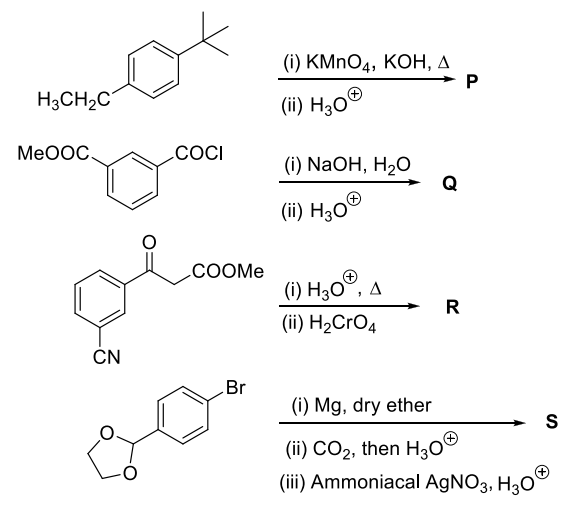Statement-1: All combustion reactions are exothermic.
Statement-2: Enthalpies of products greater than enthalpies of reactants
Statement-1 is true, Statement-2, is true, Statement -2 is a correct explanation for statement-1
Statement-1 is true, Statement-2, is true, Statement -2 is not a correct explanation for statement-1
Statement-1 is true, Statement-2 is false
Statement-1 is false, Statement-2 is true
The correct Answer is:C
Step by step video, text & image solution for Statement-1: All combustion reactions are exothermic. Statement-2: Enthalpies of products greater than enthalpies of reactants (Sv_(p)D_(f)H(P) gt Sv_(R)D_(f)(R)) by Chemistry experts to help you in doubts & scoring excellent marks in Class 11 exams.
Topper's Solved these Questions
- BOOK - NARAYNACHAPTER - THERMODYNAMICSEXERCISE - Level-VI150videos
THERMODYNAMICS
- BOOK - NARAYNACHAPTER - THERMODYNAMICSEXERCISE - Passages13videos
THERMODYNAMICS
- BOOK - NARAYNACHAPTER - THERMODYNAMICSEXERCISE - Level-II (H.W)24videos
THERMODYNAMICS
- BOOK - NARAYNACHAPTER - STRUCTURE OF ATOMEXERCISE - EXERCISE - IV EXEMPLAR PROBLEMS24videos
STRUCTURE OF ATOM
Similar Questions
Knowledge Check
- Question 1 - Select One
All combustion reactions are exothermic.
Enthalpies of products are greater than enthalpies of reactants (ΣvpΔfH(P)>ΣvRΔfH(R))AIf both the statements are TRUE and STATEMENT-2 is the correct explanation of STATEMENT-14BIf both the statements are TRUE but STATEMENT-2 is NOT the correct explanation of STATEMENT-14CIf STATEMENT-1 is TRUE and STATEMENT-2 is FALSEDIf STATEMENT-1 is FALSE and STATEMENT-2 is TRUE - Question 2 - Select One
Statement-1: Most of the combustion reacton are exothermic.
Because Statement-2: Products are more stable than reactants in exothermic process.AStatement-1 is true, statement-2 is true, statement-2 is a correct explanation for statement-1BStatement-1 is true, statement-2 is true, statement-2 is not a correct explnation for statement-1CStatement-1 is true, statement-2 is false.DStatement-1 is false, statement-2 is true. - Question 3 - Select One
Statement-1: Combustion of all organic compounds is an exothermic reaction .
Statement-2: The enthalpy of formation of all elements in their standard state are zero.AStatement-1 is True, Statement -2 is True, Statement-2 is a correct explanation for Statement-1.BStatement -1 is True ,Starement -2 is True ,Statement-2 is not a correct explanation for Statement-1CStatement-1 is True ,Statement-2 is False.DStatement-1 is False ,Statement-2 is True.
In the following reactions, P, Q, R, and S are the major products.

The correct statement(s) about P, Q, R, and S is(are)View SolutionStatement -1: ΔH of a reaction is independent of temperature.
and Statement -2: ΔH∘ of a reacction =∑H∘(products)−∑H∘(reactants)View SolutionA: ΔH is positive for endothermic reactions.
R : If total enthalpies of reactants and products are HR&HP respectively then for an endothermic reaction HR<HPView SolutionStatement-1: Fluorine has a less negative electron gain enthalpy than chlorine.
Statement-2: There is relative greater effectivebess of 2p-electrons in the small F atom to repel the additional electron entering the atom than to 3p-electrons in the large CI atom.View SolutionStatement-1: The enthalpy of formation of H_(2)O(l)is greater than of H_(2)O(g) in magnitude.
Statement -2: Enthalpy chnge Is negative for the condensation reaction
H2O(g)→H2O(l)View Solution
